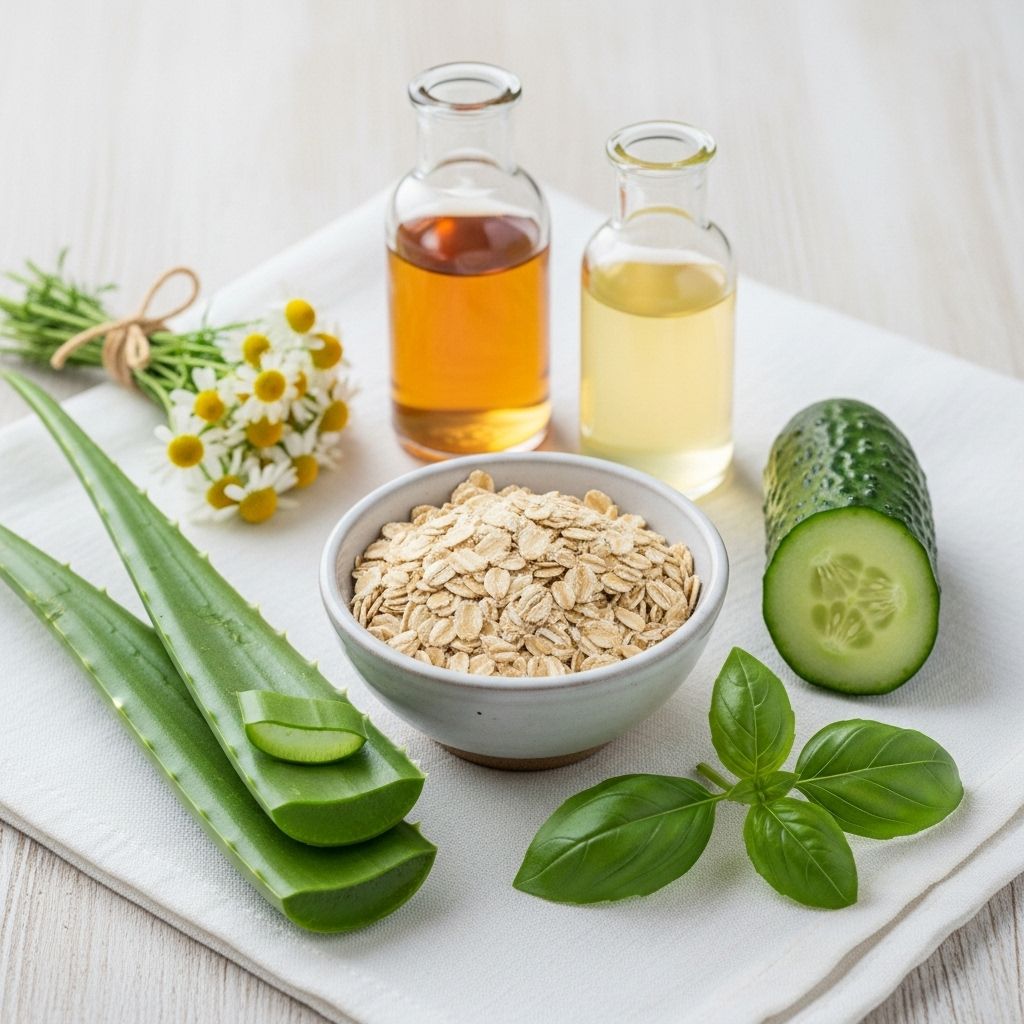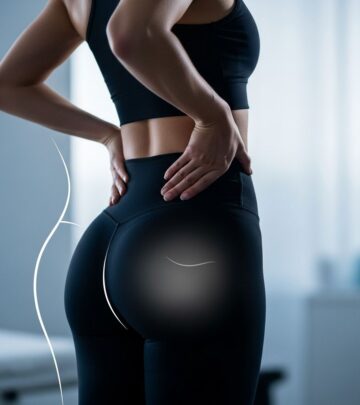Natural Remedies for Vaginal Itching: Safe Relief and Self-Care Tips
Gentle, plant-based approaches soothe discomfort and support intimate wellness.

Vaginal itching is a common yet uncomfortable concern many women experience at some point. Often, this symptom is triggered by issues ranging from minor irritations to infections and hormonal changes. While medical treatment is sometimes necessary, many causes can be safely managed or eased at home with natural remedies and lifestyle adjustments.
Table of Contents
- Common Causes of Vaginal Itching
- Lifestyle Habits and Preventive Tips
- Natural Remedies You Can Try at Home
- When to Seek Medical Attention
- Frequently Asked Questions (FAQs)
Common Causes of Vaginal Itching
Understanding the underlying causes of vaginal itching is key to finding effective relief. The following are some of the most frequent triggers:
- Yeast infections (candidiasis): Overgrowth of candida yeast, often producing intense itching, redness, and a thick white discharge.
- Bacterial vaginosis: An imbalance in normal vaginal bacteria, usually with an odor and thin grayish discharge.
- Allergic reactions or irritants: Soaps, detergents, panty liners, scented toilet paper, or body washes with fragrance can irritate the sensitive vulvar tissue.
- Sexually transmitted infections (STIs): Such as trichomoniasis or herpes, which may cause itching, burning, or unusual discharge.
- Hormonal changes: Especially during menopause, postpartum, or while breastfeeding, when estrogen levels drop, resulting in dryness and itchiness.
- Skin conditions: Such as eczema, psoriasis, or lichen sclerosus affecting the genital area.
- Poor hygiene or excess moisture: Wearing damp clothes, not changing underwear, or over-washing can contribute to irritation.
If itching is persistent, severe, or accompanied by unusual discharge or odor, it is important to consult your healthcare provider to determine the underlying cause.
Lifestyle Habits and Preventive Tips
Simple habits and hygiene choices can play a pivotal role in reducing both the frequency and severity of vaginal itching. Consider the following expert-backed preventive strategies:
- Opt for breathable, cotton underwear and change them daily, especially after sweating or swimming.
- Avoid scented or harsh soaps, douches, and intimate washes. Wash the vulva gently with warm water and unscented cleanser only if necessary.
- Wipe from front to back after using the bathroom to prevent spreading bacteria.
- Practice safe sex. Use protection and avoid sexual activity if experiencing irritation or abnormal discharge.
- Change out of wet workout or swim clothes promptly.
- Avoid tight-fitting pants or synthetic fabrics that trap moisture.
- Skip talcum powder, sprays, or perfumed products. These may further irritate sensitive tissue.
- Use a water-based, unscented lubricant during sex to minimize friction and dryness.
Natural Remedies You Can Try at Home
Several natural remedies may help ease vaginal itching and support overall vulvar comfort. While these methods can offer relief, consult a doctor before trying them, especially if symptoms are severe or persistent.
1. Cold Compress
Applying a cool compress or clean washcloth to the external area can provide instant (but temporary) relief from itching or burning. It helps numb irritated nerve endings and reduces swelling. Hold the compress for up to 10–15 minutes as needed.
2. Oatmeal Baths
Colloidal oatmeal has proven anti-inflammatory properties that soothe itching and calm inflamed skin. Add a generous handful of plain, unscented oatmeal or colloidal oatmeal powder to a lukewarm bath, soak for 15–20 minutes, then pat dry.
- Particularly helpful for itchiness due to eczema, psoriasis, or contact dermatitis.
3. Baking Soda Baths
Adding 1/4 to 1/2 cup of baking soda to bath water can help neutralize vaginal acidity, relieve irritation, and provide gentle antiseptic benefits. Soak for 10–15 minutes, no more than once daily.
- You can also make a paste (mixing baking soda with a little clean water) and apply externally to soothe itching. Rinse thoroughly after 10 minutes.
4. Yogurt (Plain, Unsweetened)
Unsweetened, plain yogurt is high in probiotics (lactobacilli), which help restore healthy vaginal flora balance and fight yeast overgrowth.
- Apply a small amount externally to the vulva for 15–20 minutes before rinsing.
- Consuming yogurt internally may support immune health and flora balance.
5. Coconut Oil
Coconut oil is a natural moisturizer with anti-inflammatory and antifungal properties. It may help soothe dryness-related itch and support healing of irritated tissue.
- Warm a small amount in clean hands and gently apply to the external vulva. Do not insert into the vaginal canal.
- Use once or twice daily as needed for external relief only.
6. Apple Cider Vinegar (ACV)
Diluted apple cider vinegar helps re-balance vaginal pH and may deter yeast overgrowth. Mix 1-2 tablespoons of organic ACV into a large glass of lukewarm water. Use as a gentle rinse to the external vaginal area, then rinse with clean water and pat dry.
- Avoid undiluted use or internal douching, as ACV can be too acidic and cause burns.
7. Aloe Vera Gel
Pure aloe vera gel (from the leaf or store-bought, fragrance-free gel) has cooling properties that may soothe itching and irritation.
- Apply a small amount to the irritated area. Leave on for 15–20 minutes, then rinse and pat dry.
- Repeat once or twice daily as needed.
8. Probiotic Supplements
Supplements containing Lactobacillus strains may help maintain healthy vaginal flora, which in turn reduces the risk of yeast or bacterial infections that cause itching. Consult your healthcare provider for dosing and brand recommendations.
9. Vitamin E
Vitamin E suppositories or topical creams may support moisture and reduce irritation, particularly for menopausal dryness. Always use products designed for vaginal application and follow instructions carefully.
10. Neem Leaf Rinse
Neem leaf has natural antimicrobial and antifungal properties. Boil a handful of fresh neem leaves in water, cool, strain, and use the water as an external rinse.
11. Garlic
Garlic is said to have antimicrobial properties, but inserting raw garlic into the vagina is not medically recommended and may cause burns or further irritation. If interested, consult your doctor about safe garlic supplements.
12. Bath Oils (Fragrance-Free Only)
Adding a few drops of a pure, fragrance-free oil to your bath can help with vulvar dryness and ease minor itching. Always patch test and avoid any scented or essential oils.
13. Hip Bath/Sitz Bath
Filling a shallow basin with warm (not hot) water and sitting in it for 10–15 minutes can soothe the vulva and relieve itching, especially after exercise or during menstruation.
Remedies Comparison Table
| Remedy | Main Benefit | Notes |
|---|---|---|
| Oatmeal Bath | Soothes inflamed skin | Good for eczema, non-infectious causes |
| Baking Soda Bath | Reduces acid, irritation | Can help with yeast or bacterial causes |
| Yogurt (Topical) | Restores flora, relieves itch | Use only plain, unsweetened yogurt |
| Coconut Oil | Moisturizes, calms inflammation | Do not use with latex condoms |
| Apple Cider Vinegar | Balances pH | Always dilute before use |
| Aloe Vera | Cools and calms skin | Ensure gel is pure and unscented |
| Probiotics | Maintains healthy vagina flora | Consult provider for best type |
| Vitamin E | Reduces dryness, irritation | Use only products designed for vaginal use |
| Neem Leaf | Antimicrobial | External rinse only |
When to Seek Medical Attention
While natural remedies can address many mild cases of vaginal itching, there are critical times when professional medical advice is necessary:
- Persistent itching that lasts beyond a week or is worsening, despite home care.
- Itching accompanied by unusual, foul-smelling, yellow, green, or thick white discharge.
- Swelling, sores, blisters, or visible rash on the vulva.
- Pain during urination or intercourse.
- Fever, chills, or overall feeling unwell.
- Recent sexual contact with a partner diagnosed with an STI.
Your doctor may recommend targeted medications or additional testing to get to the root of the symptom quickly and effectively.
Frequently Asked Questions (FAQs)
What is the most common cause of vaginal itching?
Vaginal yeast infections are one of the most common culprits, but contact irritants (such as scented products or soaps) and skin conditions (like eczema) are also frequent causes.
Can I use over-the-counter antifungal creams for vaginal itching?
Over-the-counter antifungal creams may help with yeast-related itching. However, if you have not had a yeast infection diagnosed previously or if symptoms are severe, see your doctor before self-treating.
Is it safe to use essential oils or herbal remedies?
Some essential oils and herbal remedies can irritate sensitive vaginal tissue. Stick with proven, simple remedies (like oatmeal baths, yogurt, or coconut oil) and avoid direct application of essential oils without medical guidance.
How can I prevent vaginal itching?
- Keep the area clean and dry.
- Change underwear daily and after sweating or swimming.
- Use unscented personal care products.
- Wipe front-to-back and avoid douching.
- Avoid over-washing, which can disrupt healthy bacteria.
What should I avoid when experiencing vaginal itching?
- Do not scratch—this can worsen irritation or cause infection.
- Avoid perfumed products (wipes, sprays, detergents).
- Refrain from sexual activity if it increases discomfort.
- Do not use medicated powders or unproven home mixtures without consulting a healthcare provider.
When is vaginal itching an emergency?
If you experience severe pain, profuse discharge, blisters, sores, fever, or signs of systemic illness, seek immediate medical care.
Takeaway
While vaginal itching is uncomfortable and sometimes distressing, it is usually manageable with good hygiene, simple preventive measures, and natural home remedies. Understanding triggers, adopting gentle care practices, and knowing when to call your doctor are key to long-term relief and vaginal wellness.
References
- https://www.intimaterose.com/blogs/womens-health/home-remedies-itching-vagina
- https://www.youtube.com/watch?v=aCaihW3y6xk
- https://www.medicalnewstoday.com/articles/home-remedies-for-vaginal-itching
- https://www.healthline.com/health/womens-health/itching-vagina-home-remedies
- https://www.siloamhospitals.com/en/informasi-siloam/artikel/8-natural-ways-to-relieve-vaginal-itching-
- https://www.goodrx.com/health-topic/womens-health/treating-vulvovaginitis-at-home
- https://spokaneobgyn.com/blog/latest-news/is-there-a-natural-way-to-treat-a-vaginal-infection/
- https://www.allaboutwomenmd.com/knowledge-center/vaginal-itching-causes.html
Read full bio of Sneha Tete












